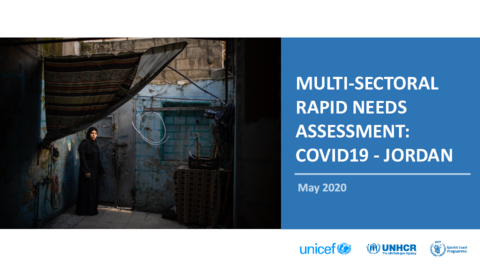
Exploring the impact of COVID-19 on families in Jordan
Since the first confirmed case of COVID-19 in Jordan in March 2020, the United Nations High Commissioner for Refugees (UNHCR), UNICEF, and World Food Program (WFP) in Jordan have mobilized to ensure that the essential basic needs of vulnerable households across the Kingdom are maintained in spite of the complex and quickly changing environment. As part of the COVID-19 response efforts and as part of an intentional shift towards collaboration and sharing of resources across the UN System, UNICEF, UNHCR and WFP have undertaken an inter-agency rapid needs assessment (RNA) to generate evidence on the impacts of the emergency on household-level basic needs. The RNA was conducted as a multi-sectoral assessment covering a broad array of sectors including Health; Food Security; Livelihoods; Education; Water, Sanitation, and Hygiene; and Protection.
Since the first confirmed case of COVID-19 in Jordan in March 2020, the United Nations High Commissioner for Refugees (UNHCR), UNICEF, and World Food Program (WFP) in Jordan have mobilized to ensure that the essential basic needs of vulnerable households across the Kingdom are maintained in spite of the complex and quickly changing environment. As part of the COVID-19 response efforts and as part of an intentional shift towards collaboration and sharing of resources across the UN System, UNICEF, UNHCR and WFP have undertaken an inter-agency rapid needs assessment (RNA) to generate evidence on the impacts of the emergency on household-level basic needs. The RNA was conducted as a multi-sectoral assessment covering a broad array of sectors including Health; Food Security; Livelihoods; Education; Water, Sanitation, and Hygiene; and Protection.



